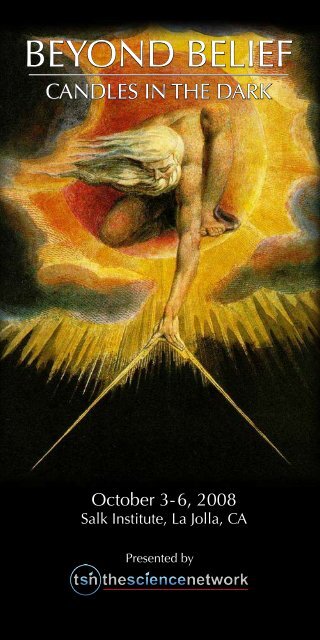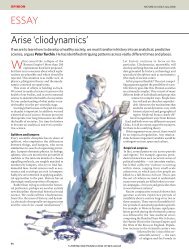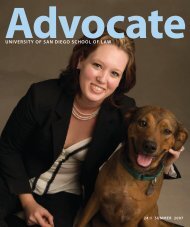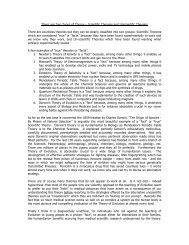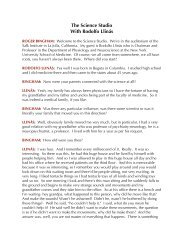BEYOND BELIEF BEYOND BELIEF - The Science Network
BEYOND BELIEF BEYOND BELIEF - The Science Network
BEYOND BELIEF BEYOND BELIEF - The Science Network
Create successful ePaper yourself
Turn your PDF publications into a flip-book with our unique Google optimized e-Paper software.
<strong>BEYOND</strong> <strong>BELIEF</strong><br />
<strong>BEYOND</strong><br />
THE SCIENCE NETWORK<br />
<strong>BELIEF</strong><br />
p r e s e n t s<br />
CANDLES IN THE DARK<br />
<strong>BEYOND</strong> <strong>BELIEF</strong><br />
CANDLES IN THE DARK<br />
October 3-6, 2008<br />
Salk Institute, La Jolla, CA<br />
Presented by<br />
1
THE SCIENCE NETWORK (TSN) is a visionary venture by a coalition of<br />
world-renowned scientists and media professionals to build a multi-media<br />
programming platform that will be a trusted destination for those concerned<br />
with science and its impact on society.<br />
We agree with Daniel Patrick Moynihan that: “Everyone is entitled to their<br />
own opinion, but not their own facts.” <strong>The</strong> <strong>Science</strong> <strong>Network</strong> is a scientific<br />
‘no-spin zone’. Part of our core mission is to provide unfiltered discussion<br />
of science issues that intersect with social policy, free from the tyranny of<br />
the sound bite.<br />
We also agree with Carl Sagan that: “It is suicidal to create a society<br />
dependent on science and technology in which hardly anybody knows<br />
anything about science and technology.” We are delivering information<br />
that closes this knowledge gap between bench scientists, citizens — and<br />
future citizens. Our mission is to inform and enlarge the science and<br />
society constituency.<br />
Francis Crick, Nobel laureate<br />
<strong>The</strong> Crick-Jacobs Center for <strong>The</strong>oretical and Computational Biology is<br />
an interdisciplinary research unit at the Salk Institute. <strong>The</strong> overall goal<br />
of the Center is to integrate experimental and theoretical approaches to<br />
understanding the organization of signaling systems and the functional<br />
neuroanatomy of the brain, from the molecular to the systems levels,<br />
and how behavior arises from the interactions between the brain’s many<br />
components. <strong>The</strong> scientists who work at the Crick-Jacobs Center combine<br />
approaches from biology, physics, chemistry, mathematics, computer<br />
science, and engineering and exploit techniques that include computer<br />
simulations, imaging, viral vectors, and molecular genetics.<br />
<strong>The</strong> Center is named in honor of Francis Crick, Salk Nobel laureate,<br />
and Irwin Jacobs, who is the co-founder and chairman of the board<br />
of San Diego-based Qualcomm Inc., an international leader in digital<br />
wireless technology.<br />
2
At <strong>The</strong> <strong>Science</strong> <strong>Network</strong> we share Carl Sagan’s<br />
vision of science as a candle in the dark. It is our mission<br />
to enlarge the constituency of reason, which is why we<br />
produce programs about science.<br />
Beyond Belief: Candles in the Dark is the third in<br />
an annual series of conversations: an ongoing project<br />
to foster and promote the use of reason in formulating<br />
social policy. This year, we are asking participants to<br />
propose a Candle — a potential solution to a problem<br />
that they have identified in their area of expertise or<br />
informed passion.<br />
In <strong>The</strong> Demon-Haunted World, Carl Sagan wrote:<br />
<strong>Science</strong> is more than a body of knowledge;<br />
it is a way of thinking. I have a foreboding of<br />
an America in my children’s or grandchildren’s<br />
time — when the United States is a service and<br />
information economy; when nearly all the key<br />
manufacturing industries have slipped away to<br />
other countries; when awesome technological<br />
powers are in the hands of a very few, and no<br />
one representing the public interest can even<br />
grasp the issues; when the people have lost the<br />
ability to set their own agendas or knowledgeably<br />
question those in authority; when, clutching our<br />
crystals and nervously consulting our horoscopes,<br />
our critical faculties in decline, unable to<br />
distinguish between what feels good and what’s<br />
true, we slide, almost without noticing, back into<br />
superstition and darkness.<br />
At <strong>The</strong> <strong>Science</strong> <strong>Network</strong>, we embrace scientific<br />
meliorism (last year’s meeting, after all, was entitled<br />
Enlightenment 2.0). We support science in its search<br />
for solutions. Can we better understand the neural<br />
underpinnings of human nature, our decisionmaking<br />
processes, the dynamics of trust and fear and<br />
human flourishing<br />
This U.S. election year, when science and reason<br />
in the nation’s deliberations have been repeatedly<br />
challenged as irrelevant or elitist, and science<br />
seems to be estranged from society, Sagan’s words<br />
sound prophetic — an alarm call. Beyond Belief:<br />
Candles in the Dark is our response.<br />
Roger Bingham<br />
Director<br />
<strong>The</strong> <strong>Science</strong> <strong>Network</strong><br />
3
Peter Atkins was Professor of Chemistry at the<br />
University of Oxford from 1965 until his retirement in<br />
2007. He is the author of over 60 books including Four<br />
Laws that Drive the Universe, Galileo’s Finger: <strong>The</strong> Ten<br />
Great Ideas of <strong>Science</strong> and the world-renowned textbook<br />
Physical Chemistry. He is involved in a variety of<br />
international activities including chairing the Committee<br />
on Chemistry Education of the International Union of<br />
Pure and Applied Chemistry and organizing<br />
the Malta series of conferences.<br />
Patricia Smith Churchland, UC President’s<br />
Professor of Philosophy, UC San Diego, focuses<br />
on neuroethics and attempts to understand choice,<br />
responsibility and the basis of moral norms in<br />
terms of brain function, evolution and brainculture<br />
interactions. Her books include Brain-Wise,<br />
Neurophilosophy: Toward a Unified <strong>Science</strong> of<br />
the Mind-Brain and On the Contrary, with Paul M.<br />
Churchland.<br />
Paul Davies is Director of <strong>BEYOND</strong>: Center for<br />
Fundamental Concepts in <strong>Science</strong> and Co-Director of<br />
the Cosmology Initiative at Arizona State University. He<br />
is a theoretical physicist, cosmologist, astrobiologist and<br />
best–selling author, and his research ranges from the<br />
origin of the universe to the origin of life, and includes<br />
the properties of black holes, the nature of time and<br />
quantum field theory. He is the recipient of numerous<br />
awards, including the 1995 Templeton Prize, and the<br />
2002 Michael Faraday Prize from the Royal Society.<br />
Nita Farahany researches and writes about the<br />
intersection of criminal law, genetics, neuroscience<br />
and philosophy. She does so with an interdisciplinary<br />
background in Genetics from Dartmouth College, a<br />
master’s degree concentrating in biology, from Harvard<br />
University, and a J.D., M.A. and Ph.D. in philosophy of<br />
biology and philosophy of law, from Duke University.<br />
She is the editor of the forthcoming volume Genes<br />
and Justice: <strong>The</strong> Impact of Behavioral Genetics and<br />
Neuroscience on Criminal Law.<br />
Owen Flanagan is James B. Duke Professor<br />
of Philosophy at Duke University. He also holds<br />
appointments in Psychology and Neurobiology and is a<br />
Faculty Fellow in Cognitive Neuroscience. In 1998, he<br />
was recipient of the Romanell National Phi Beta Kappa<br />
award, given annually to one American philosopher for<br />
distinguished contributions to philosophy and the public<br />
understanding of philosophy. He has written several<br />
books; the most recent is <strong>The</strong> Really Hard Problem:<br />
Meaning in a Material World.<br />
Jonathan Glover is Professor at the Centre of Medical<br />
Law & Ethics at King’s College London, as well as a<br />
Distinguished Research Fellow at the Oxford Uehiro<br />
Centre for Practical Ethics. His books include Humanity:<br />
A Moral History of the Twentieth Century, What Sort of<br />
People Should <strong>The</strong>re Be and Causing Death and Saving<br />
Lives, the first philosophical study of the then futuristic<br />
issues of genetic engineering and of neuroethics. He is<br />
currently interested in a number of issues in global ethics<br />
and ethical issues in psychiatry.<br />
4
Beatrice Golomb is Associate Professor of Medicine<br />
at UC San Diego, best known for her work on<br />
Gulf War illness (she has testified before Congress, her<br />
RAND reports have changed US policy and she served as<br />
Scientific Director and Chief Scientist for the Department<br />
of Veterans Affairs Research Advisory Committee on Gulf<br />
War Veterans Illnesses). She also heads the UC San Diego<br />
Statin Study group. Her work has engendered broad<br />
media interest, from <strong>The</strong> New York Times to Jon Stewart’s<br />
<strong>The</strong> Daily Show.<br />
Anthony Grayling is Professor of Philosophy<br />
at Birbeck College, University of London, and a<br />
Supernumerary Fellow of St Anne’s College, Oxford.<br />
He has written and edited many books on philosophy<br />
and other subjects; among his most recent are a<br />
biography of William Hazlitt and a collection of essays.<br />
For several years he wrote the “Last Word” column for<br />
the Guardian and is a regular reviewer for the Times<br />
Literary Review and the Financial Times.<br />
Güven Güzeldere is Associate Professor of<br />
Psychological and Brain <strong>Science</strong>s and of Neurobiology at<br />
Duke University. He has published articles on philosophy<br />
of mind, history and philosophy of psychology, and<br />
artificial intelligence. He is a founder of Stanford<br />
Electronic Humanities Review, a founding associate<br />
editor of Psyche: An Interdisciplinary Journal of Research<br />
on Consciousness, and a founding member of the<br />
Association for the Scientific Study of Consciousness.<br />
Jonathan Haidt is an Associate Professor of Psychology<br />
at the University of Virginia. He studies the emotional<br />
and intuitive foundations of morality. His current work is<br />
based on the idea that morality is a team sport and that<br />
political liberals don’t understand the game the other side<br />
is playing. He is the author of <strong>The</strong> Happiness Hypothesis<br />
and is currently writing <strong>The</strong> Righteous Mind: Why Good<br />
People are Divided by Politics and Religion.<br />
Sam Harris is the author of <strong>The</strong> New York Times<br />
bestsellers, <strong>The</strong> End of Faith: Religion, Terror and the Future<br />
of Reason which won the 2005 PEN/Martha Albrand Award<br />
for First Nonfiction, and Letter to a Christian Nation. His<br />
writing has appeared in Newsweek, Los Angeles Times, <strong>The</strong><br />
Atlantic, <strong>The</strong> Times (London), <strong>The</strong> Boston Globe, the Annals<br />
of Neurology, and elsewhere. He is currently researching<br />
the neural basis of religious belief while completing a<br />
doctorate in neuroscience. He is also<br />
a Co-Founder and Chairman of <strong>The</strong> Reason Project.<br />
Tony Haymet is the tenth director of Scripps Institution of<br />
Oceanography at the UC San Diego. Haymet also serves<br />
as UC San Diego’s Vice Chancellor for Marine <strong>Science</strong>s<br />
and Dean of the Graduate School of Marine <strong>Science</strong>s, and<br />
is a Professor of Oceanography at Scripps and Chemistry<br />
at UC San Diego. Tony is a founder and currently Vice-<br />
Chair of CleanTech San Diego, a business development<br />
organization dedicated to the practical response to climate<br />
change issues.<br />
5
Marco Iacoboni is Marco Iacoboni is Professor of<br />
Psychiatry and Biobehavioral <strong>Science</strong>s and Director<br />
of the Transcranial Magnetic Stimulation Lab at the<br />
Ahmanson-Lovelace Brain Mapping Center. He is also a<br />
member of the Brain Research Institute and of the UCLA<br />
Center for Culture, Brain, and Development. Iacoboni<br />
studies the neural mechanisms of imitation and social<br />
cognition in humans, and he is author of the recent book<br />
on mirror neurons entitled Mirroring People: <strong>The</strong> New<br />
<strong>Science</strong> of How We Connect with Others.<br />
Sheril Kirshenbaum is co-author of A Culture Without<br />
<strong>Science</strong>: How Scientific Illiteracy Threatens America’s<br />
Future—And What We Can Do About It with Chris<br />
Mooney describing the growing disconnect between<br />
science and society. She has worked in the Senate on<br />
energy, climate, and ocean policy and helped found<br />
<strong>Science</strong>Debate2008. A former pop radio disc jockey<br />
and musician, Sheril is now a science writer and Seed<br />
blogger based at Duke University.<br />
Brian Knutson is Associate Professor of Psychology and<br />
Neuroscience at Stanford University. His laboratory uses<br />
multiple methods (e.g., psychometrics, psychophysiology, brain<br />
imaging, and pharmacology) to investigate neural mechanisms<br />
that support emotional experience, and explores implications<br />
for clinical disorders of affect and addiction, as well as for<br />
economic decision-making. He has received Young Investigator<br />
Awards from the American Psychiatric Association, the National<br />
Alliance for Research on Schizophrenia and Depression, and<br />
the Academy of Behavioral Medicine Research.<br />
Adam Kolber is a law professor at the University<br />
of San Diego who recently completed a Laurance S.<br />
Rockefeller Visiting Fellowship at Princeton University’s<br />
Center for Human Values. He writes about legal and<br />
ethical implications of emerging neurotechnologies. Most<br />
recently, he has written about methods of measuring pain<br />
and punishment. He runs the Neuroethics & Law Blog<br />
and is an associate editor of the journal Neuroethics.<br />
George F. Koob is a Professor and Chair of the<br />
Committee on the Neurobiology of Addictive Disorders<br />
at <strong>The</strong> Scripps Research Institute and Adjunct Professor<br />
in the Departments of Psychology and Psychiatry, and<br />
Adjunct Professor in the Skaggs School of Pharmacy<br />
and Pharmaceutical <strong>Science</strong>s at the UC, San Diego. Dr.<br />
Koob’s research interests are directed at the neurobiology<br />
of drug addiction, with a focus on the theoretical<br />
constructs of reward and stress.<br />
Lawrence M. Krauss is Foundation Professor in the<br />
School of Earth and Space Exploration and the Physics<br />
Department, Co-Director of the Cosmology Initiative<br />
and Inaugural Director of the Origins Initiative at<br />
Arizona State University. He is an internationally known<br />
theoretical physicist with wide research interests,<br />
including the interface between elementary particle<br />
physics and cosmology, where his studies include the<br />
early universe, the nature of dark matter, general relativity<br />
and neutrino astrophysics.<br />
6
Sir Harold Kroto is Francis Eppes Professor in the<br />
Department of Chemistry and Biochemistry at Florida State<br />
University. In 1996, he was awarded the Nobel Prize in<br />
Chemistry for the discovery of C60 Buckminsterfullerene.<br />
In 1995, he inaugurated the Vega <strong>Science</strong> Trust, and<br />
in 2007, he started the Global Education Outreach in<br />
<strong>Science</strong>, Engineering and Technology (GEOSET) at FSU.<br />
He has received many scientific awards including the<br />
Royal Society’s prestigious Michael Faraday Award. He<br />
was elected to the National Academy of <strong>Science</strong>s in 2007.<br />
Leon Lederman is Director Emeritus of Fermi National<br />
Accelerator Laboratory (Fermilab) in Batavia, Illinois and<br />
Professor of <strong>Science</strong> at Illinois Institute of Technology in<br />
Chicago. He founded the Illinois Mathematics and <strong>Science</strong><br />
Academy in Aurora, Illinois in 1986, and has served in the<br />
capacity of Resident Scholar since 1998. He has also served<br />
as President and Chairman of the American Association for<br />
the Advancement of <strong>Science</strong>, is a member of the National<br />
Academy of <strong>Science</strong>, and has received numerous awards<br />
including the Nobel Prize in Physics (1988).<br />
Sonja Lyubomirsky is Professor of Psychology at the<br />
University of California, Riverside. Her honors include<br />
a Faculty of the Year Award, Faculty Mentor of the Year<br />
Award, a Templeton Positive Psychology Prize, and a<br />
million-dollar grant from NIMH to conduct research on<br />
the possibility of permanently increasing happiness. Her<br />
book, <strong>The</strong> How of Happiness, was released in January<br />
2008 by Penguin Press and translated into 15 languages.<br />
Chris Mooney is a contributing editor to <strong>Science</strong><br />
Progress, senior correspondent for <strong>The</strong> American<br />
Prospect magazine and author of two books - the New<br />
York Times bestselling <strong>The</strong> Republican War on <strong>Science</strong><br />
and Storm World: Hurricanes, Politics, and the Battle<br />
Over Global Warming. He also writes <strong>The</strong> Intersection<br />
blog with Sheril Kirshenbaum.<br />
Erin O’Hara is Professor of Law, Associate Dean<br />
for Academic Affairs, and Director of the Law and<br />
Human Behavior Program at Vanderbilt University<br />
Law School. One of Erin’s primary research interests<br />
involves conciliation: the effort to integrate theoretical<br />
and empirical insights from multiple academic fields,<br />
including economics, positive political theory, cognitive<br />
psychology, behavioral biology, and neuroscience, to<br />
more effectively formulate legal policies that regulate<br />
human behavior.<br />
Naomi Oreskes is Provost of Sixth College, Professor<br />
of History and <strong>Science</strong>s Studies and Adjunct Professor of<br />
Geosciences at UC San Diego and one of the nation’s leading<br />
experts on the history of earth and environmental science. Her<br />
work came to public attention in 2004 with the publication of<br />
“<strong>The</strong> Scientific Consensus on Climate Change” in <strong>Science</strong> and<br />
was featured in Vice President Gore’s film, An Inconvenient<br />
Truth. Her forthcoming book is FIGHTING FACTS: How<br />
a Handful of Scientists Have Muddied the Waters on<br />
Environmental Issues from Tobacco to Global Warming.<br />
7
Amanda Pustilnik conducts research and teaches in<br />
the area of law and neuroscience at Harvard Law School.<br />
She is a graduate of Yale Law School, practiced litigation<br />
at Sullivan & Cromwell and Covington & Burling, and<br />
has served as a visiting scholar at Emmanuel College,<br />
Cambridge, in History of <strong>Science</strong>. She is also counsel to<br />
the Board of <strong>Network</strong> 20/20, a foreign policy not-forprofit<br />
organization.<br />
V.S. Ramachandran is Director of the Center for<br />
Brain and Cognition and Professor with the Psychology<br />
Department and the Neurosciences Program at the UC<br />
San Diego. A former BBC Reith Lecturer, he co-authored<br />
Phantoms in the Brain: Probing the Mysteries of the<br />
Human Mind, with Sandra Blakeslee, and is the author of<br />
A Brief Tour of Human Consciousness and a forthcoming<br />
book on human uniqueness.<br />
Sally Satel is a scholar at the American Enterprise<br />
Institute, and staff psychiatrist at the Oasis Clinic in<br />
Washington, D.C. She has published articles on cultural<br />
aspects of medicine and science in the New York Times,<br />
New Republic, Commentary, Atlantic Monthly, New<br />
York Times Magazine, and Wall Street Journal. Dr. Satel<br />
is the author of PC, M.D.: How Political Correctness<br />
Is Corrupting Medicine; Drug Treatment: <strong>The</strong> Case for<br />
Coercion; and coauthor of One Nation Under <strong>The</strong>rapy.<br />
Terrence Sejnowski is an HHMI investigator, the<br />
Francis Crick Professor and Director of the Crick-Jacobs<br />
Center for <strong>The</strong>oretical and Computational Biology at the<br />
Salk Institute. He is author of several books including <strong>The</strong><br />
Computational Brain and Liars, Lovers, and Heroes: What<br />
the New Brain <strong>Science</strong> Reveals About How We Become<br />
Who We Are.<br />
Michael Shermer is the Founding Publisher of Skeptic<br />
magazine (www.skeptic.com), a monthly columnist<br />
for Scientific American, the host of the Skeptics<br />
Distinguished <strong>Science</strong> Lecture Series at Caltech and<br />
Adjunct Professor of Economics at Claremont Graduate<br />
University. His most recent book on evolutionary<br />
economics is <strong>The</strong> Mind of the Market. He is also the<br />
author of Why Darwin Matters: Evolution and the Case<br />
Against Intelligent Design and How We Believe: <strong>Science</strong>,<br />
Skepticism, and the Search for God.<br />
Walter Sinnott-Armstrong is Professor of Philosophy<br />
and the Hardy Professor of Legal Studies at Dartmouth<br />
College, as well as the Co-director of the MacArthur Law<br />
and Neuroscience Project. His research interests include<br />
ethics, philosophy of law, epistemology, and informal<br />
logic. Currently he is working on moral psychology<br />
and brain science, and the uses and implications of<br />
neuroscience for legal systems. He has recently edited<br />
three volumes on the evolution, cognitive science and<br />
neuroscience of morality.<br />
8
Peter Turchin is Professor of Ecology and Mathematics<br />
at the University of Connecticut. He is the author of more<br />
than 100 articles including ten in Nature and <strong>Science</strong>.<br />
He has written five books, the latest of which is War and<br />
Peace and War: <strong>The</strong> Life Cycles of Imperial Nations, Pi<br />
Press. Much of his work concerns a new field known<br />
as cliodynamics, which attempts to discover general<br />
principles that explain the functioning and dynamics of<br />
historical societies.<br />
Paul J. Zak is the founding Director of the Center for<br />
Neuroeconomics Studies and Professor of Economics<br />
at Claremont Graduate University. Zak also serves<br />
as Professor of Neurology at Loma Linda University<br />
Medical Center, and is a Senior Researcher at UCLA.<br />
Zak is credited with the first published use of the term<br />
“neuroeconomics” and has been a vanguard in this<br />
new discipline. He organized and administers the first<br />
doctoral program in neuroeconomics in the world.<br />
Philip Zimbardo is Professor Emeritus at Stanford<br />
University and is internationally recognized as a leading<br />
“voice and face of contemporary psychology” through his<br />
widely seen PBS-TV series, Discovering Psychology, his<br />
media appearances, best-selling trade books on shyness,<br />
and his classic research, <strong>The</strong> Stanford Prison Experiment.<br />
He is the author of over 300 professional publications<br />
and 50 books including the oldest current textbook in<br />
psychology, Psychology and Life, and <strong>The</strong> Lucifer Effect:<br />
Understanding How Good People Turn Evil.<br />
Roger Bingham is Co-founder and Director of<br />
<strong>The</strong> <strong>Science</strong> <strong>Network</strong>. He is also a member of<br />
the Computational Neurobiology Laboratory at the Salk<br />
Institute for Biological Studies and the Institute for Neural<br />
Computation at UC San Diego. He is the co-author of <strong>The</strong><br />
Origin of Minds: Evolution, Uniqueness, and the New<br />
<strong>Science</strong> of the Self, and the creator and host of Emmy<br />
award-winning PBS science programs on evolutionary<br />
psychology and cognitive neuroscience, including the<br />
critically acclaimed series <strong>The</strong> Human Quest.<br />
Images:<br />
Ancient of Days by William Blake<br />
Charles Darwin<br />
reproduced with permission from<br />
John van Wyhe ed.,<br />
<strong>The</strong> Complete Work of Charles Darwin Online<br />
http://darwin-online.org.uk<br />
Program design by Jamie Simon<br />
9
<strong>The</strong> <strong>Science</strong> <strong>Network</strong> Advisory Board<br />
TERRENCE SEJNOWSKI, Chair<br />
Director, Crick-Jacobs Center for Computational and <strong>The</strong>oretical Biology, Salk Institute for Biological<br />
Studies; Director, Institute for Neural Computation, UC San Diego<br />
JOHN ALLMAN<br />
Hixon Professor of Biology, California Institute of Technology<br />
RICHARD ATKINSON<br />
President Emeritus, University of California; Director Emeritus, National <strong>Science</strong> Foundation<br />
WENDELL BAILEY<br />
Former Vice President for <strong>Science</strong> and Technology, National Cable Television Association<br />
ROGER BINGHAM<br />
Institute for Neural Computation, UC San Diego<br />
J. MICHAEL BISHOP<br />
Nobel Laureate; Chancellor, UC San Francisco<br />
COLIN BLAKEMORE<br />
Professor of Neuroscience, University of Oxford; Former Chief Executive, Medical Research Council<br />
SYDNEY BRENNER<br />
Nobel Laureate; Distinguished Professor, Salk Institute for Biological Studies<br />
PATRICIA SMITH CHURCHLAND<br />
UC President’s Professor of Philosophy, UC San Diego<br />
ANN DRUYAN<br />
Founder and CEO, Cosmos Studios<br />
MARYE ANNE FOX<br />
Chancellor, UC San Diego<br />
FRED H. GAGE<br />
Adler Professor of Genetics, Salk Institute for Biological Studies; Former President, Society for<br />
Neuroscience<br />
BEATRICE GOLOMB<br />
School of Medicine, UC San Diego<br />
DONALD KENNEDY<br />
President Emeritus, Stanford University; Editor-in-Chief Emeritus, <strong>Science</strong><br />
PATRICIA KING<br />
Carmack Waterhouse Professor of Law, Medicine, Ethics, and Public Policy, Georgetown University<br />
SIR HAROLD KROTO<br />
Nobel Laureate; Former President, Royal Society of Chemistry<br />
E.C. KRUPP<br />
Director, Griffith Observatory, Los Angeles<br />
LEON LEDERMAN<br />
Nobel Laureate; Director Emeritus, Fermi National Accelerator Laboratory; Founder, Illinois<br />
Mathematics and <strong>Science</strong> Academy, Professor of <strong>Science</strong>, Illinois Institute of Technology<br />
V.S. RAMACHANDRAN<br />
Director, Center for Brain and Cognition, UC San Diego<br />
SALLY RIDE<br />
First American woman in space; Professor of Physics, UC San Diego; President and CEO, Imaginary<br />
Lines Inc.<br />
REESE SCHONFELD<br />
Founding CEO and President, CNN; Founding CEO and President, Food <strong>Network</strong><br />
MICHAEL SHERMER<br />
Founding Publisher, Skeptic magazine; Director, the Skeptics Society<br />
ALAN TROUNSON<br />
President, California Institute for Regenerative Medicine; Founder and Executive Vice-Chairman,<br />
Australian Stem Cell Centre<br />
EDWARD WITTEN<br />
Fields Medalist; Professor, Institute for Advanced Studies, Princeton University<br />
STEPHEN WOLFRAM<br />
Founder and CEO, Wolfram Research; Creator, Mathematica<br />
PHILIP YEO<br />
Chairman of Standards, Productivity and Innovation Board, Senior Advisor on <strong>Science</strong> and<br />
Technology to the Minister for Trade and Industry, Republic of Singapore<br />
10
<strong>The</strong> <strong>Science</strong> <strong>Network</strong><br />
salutes the sponsors of<br />
<strong>BEYOND</strong> <strong>BELIEF</strong><br />
Candles in the Dark<br />
<strong>The</strong> Zeps Family<br />
11
the conversation continues<br />
F O U R T H A N N U A L<br />
<strong>BEYOND</strong> <strong>BELIEF</strong><br />
November 21-24, 2009<br />
at the Salk Institute, La Jolla, CA<br />
12
At <strong>The</strong> <strong>Science</strong> <strong>Network</strong>,<br />
we share Carl Sagan’s<br />
vision of science as<br />
a candle in the dark.<br />
www.thesciencenetwork.org<br />
13


